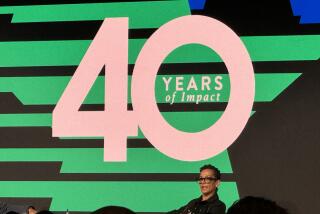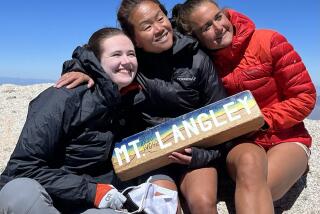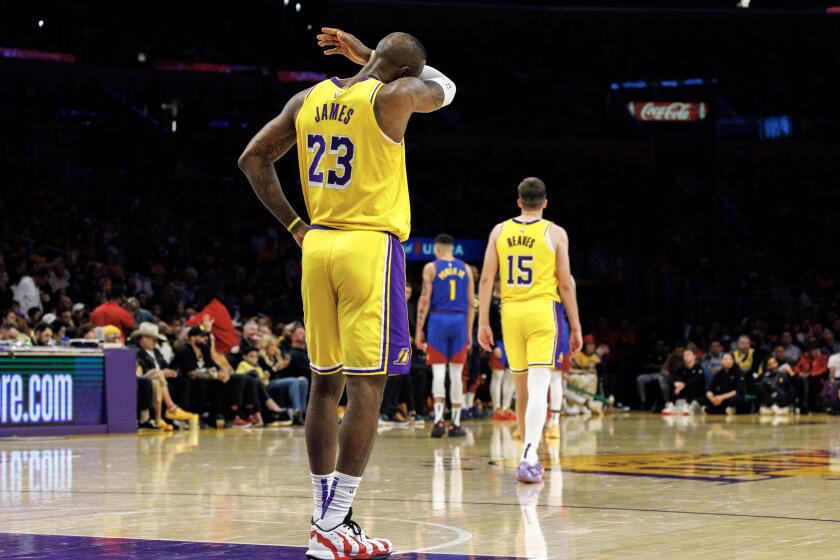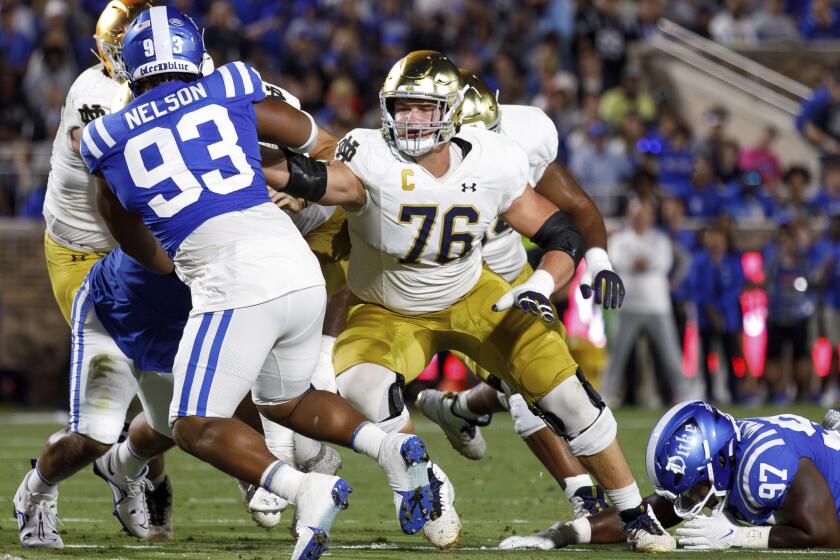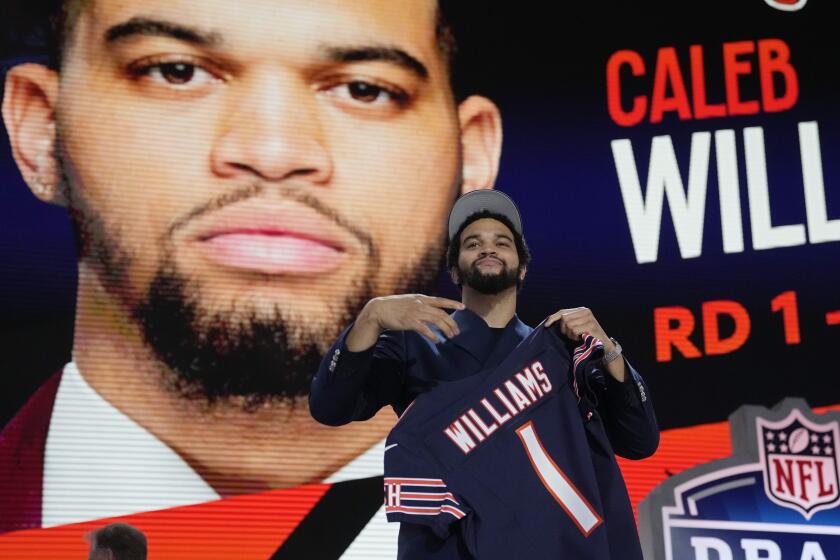The Special Olympics: Kindness, optimism, a step on the road to joy
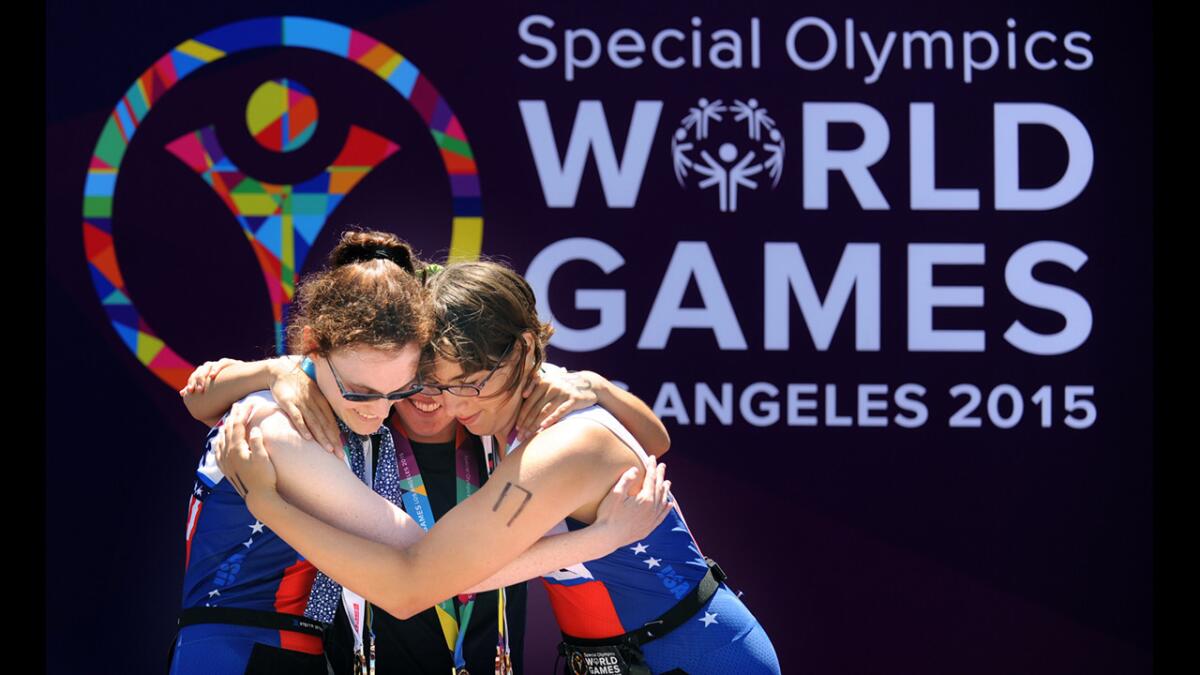
USA medal winners Amy Noctor, left, and Courtney Dreyfus, right hug gold medal winner Florencia Barranque after the triathlon competition of the Special Olympics in Long Beach on Sunday.
I’ve never been crazy about the descriptive “special” as applied to people with disabilities. It’s limiting and overly defining. It’s everything I’ve never wanted for my 25-year-old daughter Jillian, born with Down syndrome. I don’t want her to be special. I want her to be included. Besides, doesn’t everyone believe his or her children are special?
The special in Special Olympics shouldn’t be used to describe the disabilities of the competitors. That comes off as patronizing. It should apply to how they compete, though. They are special that way.
Jillian isn’t in the World Games in Los Angeles. She swam at our local and state Special Olympics meets for several years, though. I went to them all. Because I am a trained, veteran professional sports journalist, I began to notice a few small differences between typical Olympians and their Special peers:
Typical Olympians do not yell “Play ball!” at the conclusion of the national anthem, as Special Olympians sometimes do. Typical Olympians don’t do cannonballs off the starting block, or flex like Hulk Hogan on the medal stand.
Michael Phelps never helped Ryan Lochte out of the pool, at least not with the sincerity that Special Olympians help one another. They finish second and congratulate the first-place finisher.
Anywhere else but in the Special Olympics, sportsmanship works best as a concept. The idea of being genuinely kind to a fellow competitor is far more prevalent than the actual kindness. In the Special Olympics, kindness comes with the chlorine in the pool and the cinders on the track.
I cannot speak for any Special Olympian but my own. Jillian’s Down syndrome imbued her with compassion that is unusual for most of us, and with an endearing freedom from guile. Jillian leads with her heart. That’s all she knows. If you see the athletes this week, you’ll know she’s not unique.
“I love my life,” Jillian will say, at times both random and appropriate, which makes me pause to wonder why I’m not saying the same thing.
Henry David Thoreau, noted 19th century humanist whose works were both special and Olympian in their impact, said, “It’s not what you look at that matters. It’s what you see.”
Emblazon that on every finish line this week, engrave it on every medal. The road to joy begins with seeing. Looking leads nowhere.
The difference between the two is the canyon between understanding and indifference. If you look at a Special Olympian, running a 400-meter race and sagging halfway through, maybe you feel pity and sadness, or gratitude for your own “typical” life. Seeing that runner, finishing bravely, far behind the winner yet still getting hugs and smiling, you feel something far different.
Dignity, perhaps. Truth, beauty, a redefining of what it means to compete. Or to be human.
Looking is passive, superficial and often judgmental. Seeing demands empathy and engagement. It’s active. Seeing is a civil right. Imagine how much better we’d be, if we spent less time looking at people, and more time seeing them.
Jillian got married last month. She graduated from high school, attended four years of college, has a full-time job, lives independently and takes four city buses to and from work. She never allowed Down syndrome to define her.
These are good times for people with disabilities. The law and the culture have swung in their favor. Jillian attended regular-education high school classes and blazed a college trail. She has many typical friendships, she’s as poised socially as anyone I know. None of this would have been possible if people spent more time looking than seeing.
These are bad times for people with disabilities. A recent poll revealed that one in five Americans would feel uncomfortable hiring a person with an intellectual disability. An April 2015 study published in the American Journal of Medical Genetics estimated that abortion following a prenatal diagnosis of Down syndrome now results in a 30% decline in overall Down births.
Just as we are starting to see people with disabilities, we’re enhancing our power to wipe them out. Non-invasive prenatal screening for birth defects is becoming very good, which is not so good for generations of future Jillians. That’s a shame.
If you’re seeking athletic virtue, or virtue of any sort, attending a Special Olympics event wouldn’t be a bad place to start. Kindness and optimism, and a lack of agendas, ego and envy, are special traits.
Paul Daugherty is a sports columnist for the Cincinnati Enquirer. His memoir of his daughter, “An Uncomplicated Life,” was published in March 2015, and is available at bookstores and online at Amazon.com. Visit his website: www.uncomplicated.life.
More to Read
Get our high school sports newsletter
Prep Rally is devoted to the SoCal high school sports experience, bringing you scores, stories and a behind-the-scenes look at what makes prep sports so popular.
You may occasionally receive promotional content from the Los Angeles Times.
